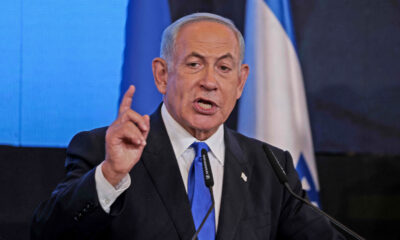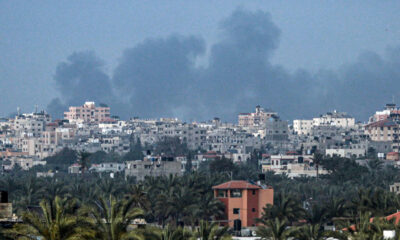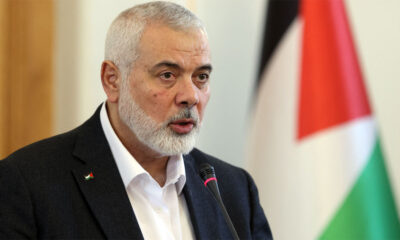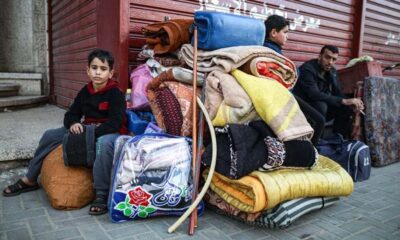International
Gaza ceasefire: Israel’s PM Benjamin Netanyahu rejects Hamas’s proposed terms
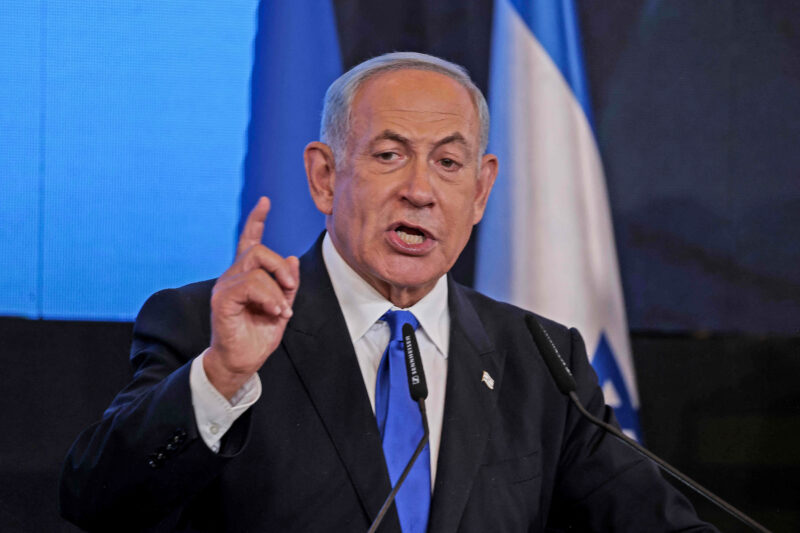
Gaza ceasefire: Israel’s PM Benjamin Netanyahu rejects Hamas’s proposed terms
Israeli Prime Minister Benjamin Netanyahu on Wednesday rejected Hamas’s terms for a ceasefire and hostage-release agreement, calling them “delusional,” a position that complicates efforts to strike a deal between the sides.
Netanyahu vowed to press ahead with Israel’s four-month-long war in the Gaza Strip against the militant group Hamas until achieving “absolute victory.”
The Israeli leader made the comments shortly after meeting U.S. Secretary of State Antony Blinken, who has been travelling the region in hopes of securing a ceasefire agreement.
“Surrendering to Hamas’s delusional demands that we heard now not only won’t lead to freeing the captives, it will just invite another massacre,” Netanyahu said during a nationally televised evening news conference.
“We are on the way to an absolute victory,” Netanyahu said, adding that the operation would last months, not years. “There is no other solution.”
Hamas can’t keep control: PM
Netanyahu ruled out any arrangement that leaves Hamas in full or partial control of Gaza. He also said that Israel is the “only power” capable of guaranteeing security in the long term.
Blinken said on Wednesday that he believes a ceasefire and hostage-release agreement between Israel and Hamas was still possible, despite the two sides being far apart on the central terms for a deal.
READ ALSO:
- 88.4m people in Nigeria living in extreme poverty – Fadeshemi
- NSCDC arrests five oil thieves, impounds 15,000 litres of diesel
- Court sends Lagos pastor, wife to prison over N33.8m fraud
“It’s not flipping a light switch. It’s not yes or no,” he said.
Hamas laid out a detailed, three-phase plan to unfold over four and a half months, responding to a proposal drawn up by the United States, Israel, Qatar and Egypt. The plan stipulates that all hostages would be released in exchange for hundreds of Palestinians imprisoned by Israel, including senior militants, and an end to the war.
Israel has made destroying Hamas’s governing and military abilities one of its wartime objectives, and the group’s proposal would effectively leave it in power in Gaza and allow it to rebuild its military capabilities.
U.S. President Joe Biden said Hamas’s demands are “a little over the top” but that negotiations will continue.
The deadliest round of fighting in the history of the Israeli-Palestinian conflict has levelled entire neighbourhoods and driven the vast majority of Gaza’s population from their homes. More than 27,000 Palestinians have been killed, Gaza’s Health Ministry says.
Iran-backed militant groups across the region have conducted attacks — mostly on U.S. and Israeli targets — in solidarity with the Palestinians, drawing reprisals as the risk of a wider conflict grows.
Israel remains deeply shaken by the Oct. 7 attack in which Hamas-led militants burst through the country’s vaunted defences and rampaged across southern Israel, killing some 1,200 people, mostly civilians, and abducting some 250, about half of whom remain in captivity in Gaza, according to Israeli officials.
Blinken is trying to advance the ceasefire talks while pushing for a larger postwar settlement in which Saudi Arabia would normalize relations with Israel in return for a “clear, credible, time-bound path to the establishment of a Palestinian state.”
READ ALSO:
- Alleged N754.8m fraud: Court adjourns ex-NIMASA DG, Akpobolokemi’s case till Feb. 27
- Tinubu govt doesn’t have capacity to solve Nigeria’s problems – LP
- Cote d’Ivoire beat DR Congo to set up AFCON final clash against Nigeria
But the increasingly unpopular Netanyahu is opposed to Palestinian statehood, and his hawkish governing coalition could collapse if he is seen as making too many concessions.
Ceaseless war, endless stress
There is little talk of grand diplomatic bargains in Gaza, where Palestinians yearn for an end to fighting that has upended every aspect of their lives.
“We pray to God that it stops,” said Ghazi Abu Issa, who fled his home and sought shelter in the central town of Deir al-Balah. “There is no water, electricity, food or bathrooms.”
Those living in tents have been drenched by winter rains and flooding.
New mothers struggle to get baby formula and diapers. Some have resorted to feeding solid food to babies younger than six months old despite the health risks it poses.
Blinken noted the devastation inflicted on Gaza civilians, saying that “the daily toll that [Israel’s] military operations continue to take on innocent civilians remains too high.”
The 27,707 Palestinians killed include 123 bodies brought to hospitals in just the last 24 hours, Gaza’s Health Ministry said on Wednesday, adding that at least 11,000 wounded people need to be urgently evacuated from the territory.
The ministry does not distinguish between civilians and combatants in its figures but says most of the dead have been women and children.
Israel has ordered Palestinians to evacuate areas that make up two-thirds of the tiny coastal territory. Most of the displaced are packed into the southern town of Rafah near the border with Egypt, where many are living in squalid tent camps and overflowing shelters run by the United Nations.
Hamas has continued to put up stiff resistance across the territory, and its police force has returned to the streets in places where Israeli troops have pulled back. Hamas is still holding more than 130 hostages, but about 30 of them are believed to be dead, with the vast majority killed on Oct. 7.
Gaza ceasefire: Israel’s PM Benjamin Netanyahu rejects Hamas’s proposed terms
International
Palestinian envoy lambasts US for arresting protesters

Palestinian envoy lambasts US for arresting protesters
The Palestinian Ambassador to Nigeria, Abdullahi Shawesh, on Thursday, May 16, lambasted the Western World for clamping down on student protesters who were expressing solidarity and sympathy with his country.
He stressed that the arrest and clampdown on protesters negates the Western world’s stand as promoters of freedom of speech.
He said: “When college students express their solidarity and sympathy with the Palestinians, it is labelled as hate speech and anti-Semitism. These students are beaten and harshly treated. Threatened with expulsion from universities, severe sanctions in the future, imprisonment, and facing trial.
“This is the exact meaning of hypocrisy and double standards.”
Shawesh who gave a review of the 223-day battle between the Israeli forces and Hamas, said no fewer than 45,091 Palestinians have been killed, including 15,103 children and 9,961 women.
READ ALSO:
- Police arrest suspected killers of Major-General, others in Imo
- Bandits kill three, abduct 120 in fresh Zamfara community attack
- Police grill Osun monarch, Ataoja of Osogbo, over petition
He also said the battle has consumed 142 journalists and 492 medical staff.
The envoy said no fewer than 10,000 persons have been declared missing.
He added: “78,404 wounded and injured, with 72% of the victims being children and women. 17,000 children live without one or both of their parents.”
Beside the human casualties, Shawesh also listed a number of destructions recorded, which include “243 mosques destroyed and 321 partially damaged. 3 Churches targeted and destroyed, 86,000 housing units completely destroyed and 294,000 partially damaged. 103 schools and universities destroyed. 206 archaeological and heritage sites destroyed, 75,000 tons of explosives materials dropped on Gaza.
“33 hospitals along with 54 health centres were taken out of service. A total of 160 health institutions and 126 ambulances were targeted by the Israeli occupation.”
He said the state of infrastructure devastation has forced 11,000 wounded people to travel for treatment to undergo operations.
He also said that no fewer than “10,000 cancer patients face death due to the lack of medical treatment. 1,095,000 are infected with infectious diseases as a result of displacement. 20,000 cases of viral hepatitis infection due to displacement. Tens of thousands of pregnant women are at risk due to a lack of access to healthcare. There have been 310 cases of health personnel being arrested.”
Palestinian envoy lambasts US for arresting protesters
International
UK says it’s developing radio frequency to blast out drones

UK says it’s developing radio frequency to blast out drones
The United Kingdom is making strides in military technology, developing a cutting-edge weapon using radio waves to counter drones.
Known as the Radio Frequency Directed Energy Weapon (RFDEW), this innovative system utilizes radio waves to disrupt or damage critical electronic components of enemy vehicles and drones, halting their operations or causing them to fall out of the sky.
Operable across land, air, and sea, the RFDEW boasts a range of up to 1 kilometre, with potential for future extensions. Its development follows UK Prime Minister Rishi Sunak’s commitment to increasing defence spending to 2.5% of GDP by 2030.
With an estimated cost of 0.10 Pounds (0.12 dollars) per radio waveshot, the RFDEW offers a cost-effective alternative to conventional missiles and holds promise for effectively countering drone swarms.
READ ALSO:
- Portable out with new song after leaving police custody
- Troops kill ISWAP’s bomb squad commander
- Many students injured as OAU lecture hall ceiling collapses
Utilizing a mobile power source, the technology generates pulses of radio frequency energy in a directed beam, capable of delivering sequenced shots to single or multiple targets. It can be mounted on various military vehicles, enhancing flexibility and adaptability on the battlefield.
Minister of State for Defence Procurement James Cartlidge highlighted the significance of such advancements in enhancing the effectiveness and safety of UK armed forces. He emphasized the importance of defending against unmanned systems, especially in light of recent global conflicts.
The RFDEW system will undergo rigorous testing with British soldiers during summer. Developed under Project Hersa by a collaborative team from the Defence Science and Technology Laboratory (DSTL) and Defence Equipment & Support (DE&S), in partnership with UK industry, this technology represents a significant leap in military capability.
DSTL chief executive Paul Hollinshead underscored the transformative impact of such systems, emphasizing their potential to provide decisive operational advantages and enhance national security. He credited decades of research, expertise, and investment in science and technology for enabling the development of world-class capabilities like the RFDEW.
UK says it’s developing radio frequency to blast out drones
International
Just in: In assassination attempt, Slovakia’s Prime Minister shot multiple times
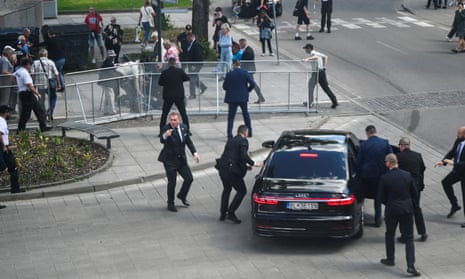
Just in: In assassination attempt, Slovakia’s Prime Minister shot multiple times

Robert Fico, Slovakia’s prime minister, has been taken to hospital in a “life-threatening condition” after he was shot multiple times on Wednesday.
According to his official social media account, the 59-year-old leader was hit in the abdomen outside the House of Culture in the town of Handlova.
Police have detained a suspect. There was no immediate information on the motive.
Reuters reported Zuzana Caputova, President of Slovakia, as condemning the “brutal and ruthless” attack on Fico.
She said in a televised statement, “A physical attack on the prime minister is, first of all, an attack on a person, but it is also an attack on democracy.”
The Russian ambassador to Slovakia Igor Bratchikov also condemned the shooting of Fico.
“I strongly condemn this act of violence and express my conviction of the necessity of punishment for the perpetrators,” Bratchikov said in a letter to Fico that the Russian embassy shared on its Facebook page.
Fico, a third-time premier with the left-wing Smer (Direction) party, won Slovakia’s September 30 parliamentary elections, staging a political comeback after campaigning on a pro-Russian and anti-American message.
-

 Business2 days ago
Business2 days agoDollar crashes against Naira at official market
-

 News1 day ago
News1 day agoUsing pre-registered SIM card may land you in jail, NCC warns
-

 metro2 days ago
metro2 days agoThree police officers sentenced to life imprisonment in Anambra
-

 News2 days ago
News2 days agoWike, Fubara are ego-driven, crude – Reno Omokri
-

 News2 days ago
News2 days agoUpdated: Reps condemn assault on Nasarawa female doctor by patient family
-
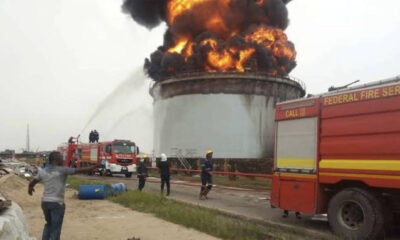
 metro16 hours ago
metro16 hours agoFire guts new NNPCL tank farm in Lagos
-

 Aviation2 days ago
Aviation2 days agoUpdated: We’ll resume Lagos-Dubai flights on October 1, says Emirates
-

 Auto3 days ago
Auto3 days ago150 OEMs, others set for Lagos motor fair, Africa autoparts expo

